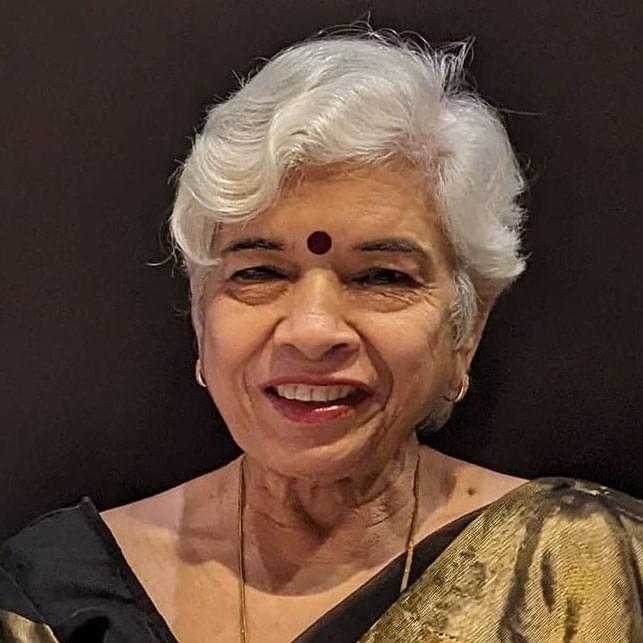Professor Rekha Pande
Rekha Pande, Ph.D. is Professor Emeritus of History and Women’s Studies at the Henry Martin Institute, International Centre for Research, Interfaith Relations and Reconciliation, Hyderabad. She is also currently the Director of the Society for Empowerment through Environment Development (SEED).
SEED is an organization with a major focus on women and child issues, and agricultural and environmental concerns. It attempts to bridge the gap between technology generation and its implementation at the end-user level. SEED provides high-quality research and consultancy services for clients and stakeholders in public policy, environmental concerns, social sectors, and health issues.
Previously, for 13 years between 2007 and 2020, she was the Director of the Centre for Women’s Studies and the Head of the Department of History at the University of Hyderabad. She established the Centre and started an M. Phil and Ph.D program and brought in Malladi Subamma trust money to establish a new building.
Rekha served as a Director of the Centre for Women’s Studies at Maulana Azad National Urdu University (MANUU), Hyderabad. It is a Central University established at the National Level in 1998 by an act of Parliament to promote and develop the Urdu language and to impart vocational and technical education in the Urdu medium through conventional and distance modes. Most of the work that she undertook focused on Muslim women’s issues.
As a feminist historian, Rekha researches the theoretical and methodological problems of reconstructing women’s history and understanding the roots of women’s subordination within the South Asian context. She also attempts to examine the varied historical contexts at the regional/local levels and explain the reproduction and subordination of women at the national and global scale — in various related, albeit different, contemporary contexts. She is an academic activist also associated with the women’s movement in India.
Read her book Women’s Work in the Unorganized Sector: Issues of Exploitation and Globalisation in the Beedi Industry.
She was a Founding Member of Streemela, a society for the development of women, and SEED (Society for Empowerment through Environment Development). She also founded the Women’s Association of Hyderabad (WAH). Rekha has focused on issues related to the minority Muslim community in India and Muslim women and has been involved with the Roda Mistry College of Social Work in designing a syllabus for the inclusion of HIV and AIDS at their undergraduate teaching level.
Rekha worked as a national core resource group member of a women’s empowerment national program called the Mahila Samakhya in India and was nominated to direct this program at the all-India national level and at the states of Uttar Pradesh, Gujarat, Uttrakhand, Bihar, Andhra Pradesh, and Jharkhand.
Read From anti-arrack to total prohibition: the women’s movement in Andhra Pradesh, India.
Rekha was born in Uttrakhand in the Himalayan valleys. Her earlier schooling was in different parts of the country. She studied at Holy Family High School and at Kendriya Vidyalaya between 1969 and 1971.
She attended the University of Allahabad, studying history, English literature, and political science. There she earned her Bachelor’s Degree of Arts in 1976, her Master’s Degree of Arts in 1978, and finally her Ph.D. in History in 1981. She also earned a Gold medal in the International Essay Writing competition and was able to spend three days with Mother Teresa, who has always been her role model for her piety and simplicity.
During her studies, from 1971 until her graduation, she worked at the University of Allahabad as a Lecturer in the Department of Medieval and Modern History.
She joined the University of Hyderabad in 1984 as Lecturer and in 1999 she continued as Reader where she taught various courses in history and guided M.Phil and Ph.D. students.
She also introduced a course on India’s religious and cultural heritage for four years at the International Institute of Information Technology. She was the founding member of two centers for women’s studies, one at Maulana Azad National Urdu University and the other at the University of Hyderabad. She was the chair of the Women’s World Congress in 2014, organized for the first time in India.
Read her Handbook of Research on Multicultural Perspectives on Gender and Aging.
She was the editor of the International Feminist Journal of Politics (IFJP). She edited Foreign Policy Analysis. She is on the editorial board of the academic journals Palgrave Communication, International Feminist Journal of Politics, International Journal of Semiotics and Visual Rhetoric (IJSVR), and Current Research Journal of Social Sciences and Humanities. She was nominated as the Peace ambassador for the South Asia region by the International Women’s Peace Group, Korea in 2016.
Read Re-Inscribing the Indian Courtesan: A Genealogical Approach.
She received a Visiting Fellowship at the Institute of Birkbeck, University of London, an International Visiting Fellowship in the School of Policy Studies at the University of Bristol, U.K. Academic Fellow, University of Buffalo, USA, International Visiting Scholar, at Maison De Research, Paris, and Visiting Professorship at the University of Artois, Arras, France.
Read The History of Feminism and Doing Gender in India, Encyclopedia of gender and information technology, and Prostitution and Beyond: An Analysis of Sex Workers in India.
Read Feminist, teacher, pioneer: A tribute to Hyderabad Uni professor Dr Rekha Pande.
Listen to Rekha Pande on Gender, Culture and History. Follow her Contributions on YouTube.
Visit her LinkedIn profile, her Homepage, and her Wikipedia page. Follow her on Google Scholar, Academia, ResearchGate, Facebook, and Twitter.





